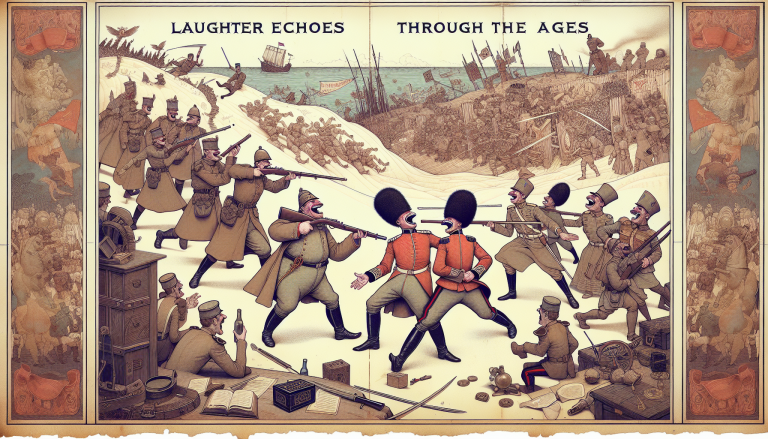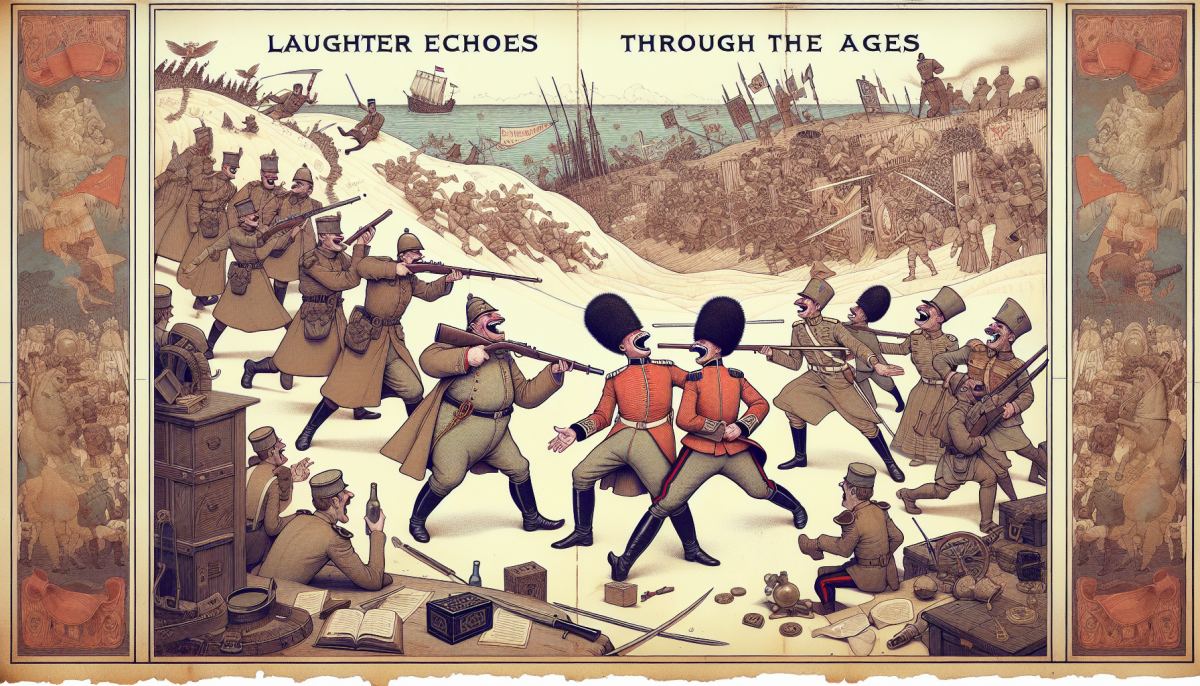The Unending Farce: A Comical Retelling of History’s Most Futile Efforts
In the grand tapestry of human history, there are moments that, upon closer inspection, resemble a quixotic dance of futility. One such episode that perfectly encapsulates the phrase “beating a dead horse” is the tale of the Battle of Karánsebes, a military blunder of epic proportions that still manages to elicit chuckles centuries later.
The year was 1788, and the Austro-Hungarian Empire found itself embroiled in a conflict with the Ottoman Turks. As the troops prepared for a decisive engagement, a series of comical mishaps unfolded that would make even the most seasoned military strategist shake their head in disbelief.
It all began with a simple request for some much-needed refreshment. As the sun dipped below the horizon, a group of thirsty soldiers stumbled upon a nearby town, eager to quench their thirst with a few rounds of schnapps. Alas, their attempts to procure the precious elixir were met with a case of mistaken identity, as the locals mistook the soldiers for the enemy.
Pandemonium ensued, with the bewildered townspeople unleashing a hail of gunfire upon the unsuspecting troops. Caught off guard, the soldiers scattered, some even turning on their own comrades in a bout of friendly fire. The situation quickly spiraled out of control, as more units arrived on the scene, each one frantically trying to outmaneuver the perceived threat.

A Blunder of Epic Proportions
As the chaos unfolded, the hapless commanders found themselves at a loss, desperately trying to bring order to the maelstrom. But their attempts to de-escalate the situation only added to the comedy of errors. Imagine the sight of seasoned officers frantically waving white flags, only to be met with a renewed barrage of gunfire from their own troops, who had mistaken the gesture for a surrender to the enemy.
The carnage continued well into the night, with both sides engaged in a bafflingly futile battle, each one convinced that they were fighting the opposing forces. By the time the dust settled, the Austro-Hungarians had suffered a staggering 10,000 casualties – a devastating blow that was not inflicted by the Ottomans, but by their own troops.
“It was a textbook example of the phrase ‘beating a dead horse,'” quipped renowned military historian, Professor Archibald Timmons. “The soldiers were so committed to the idea of an enemy that they refused to acknowledge the reality staring them in the face. The result was a truly epic display of military incompetence.”
Lessons Learned (or Not)
One would think that such a catastrophic blunder would serve as a cautionary tale, a stark reminder of the dangers of blind obedience and the importance of clear communication. Alas, history has a way of repeating itself, and the Battle of Karánsebes is not the only example of a futile military endeavor.
Take, for instance, the ill-fated Charge of the Light Brigade during the Crimean War. In 1854, a group of British cavalry, led by the intrepid Lord Cardigan, found themselves on the receiving end of a series of questionable orders that sent them charging directly into the jaws of the Russian artillery. Despite the obvious futility of their mission, the soldiers pressed on, their bravery and discipline ultimately leading to their demise.
As one observer so eloquently put it, “It was a magnificent display of courage, but it was not war.” The Charge of the Light Brigade has since become a byword for the perils of blindly following orders, a poignant reminder that sometimes the most heroic actions can also be the most foolish.
Politics and the Art of Beating a Dead Horse
The realm of politics, too, has its fair share of “dead horse” moments, where individuals and factions cling to a cause or agenda long after it has become clear that their efforts are in vain. Take, for example, the endless debate surrounding the existence of weapons of mass destruction in Iraq, a controversy that dragged on for years despite a lack of conclusive evidence.
“It was like watching a bunch of people trying to resuscitate a horse that had been dead for weeks,” quipped political analyst Doris Wittgenstein. “No matter how much they beat the issue, the reality remained the same: there were no WMDs, and the entire endeavor was a colossal waste of time and resources.”
Yet, even in the face of overwhelming evidence to the contrary, some individuals and groups refuse to let go, stubbornly clinging to their positions and refusing to acknowledge the futility of their efforts. It’s a phenomenon that has been observed time and time again in the halls of power, where the pursuit of political gain often trumps the need for pragmatism and common sense.
As the old adage goes, “You can lead a horse to water, but you can’t make it drink.” And when it comes to the world of politics, it seems that you can’t even make the horse admit that it’s dead.
So, the next time you find yourself caught in the throes of a futile endeavor, whether it be on the battlefield or in the political arena, take a moment to reflect on the timeless wisdom of “beating a dead horse.” For in the end, the only thing you’ll accomplish is a sore arm and a whole lot of wasted effort.
